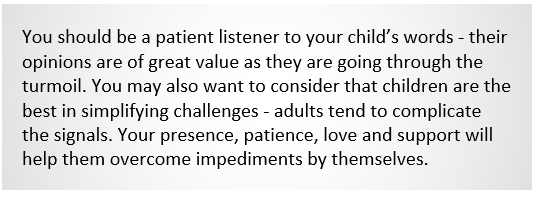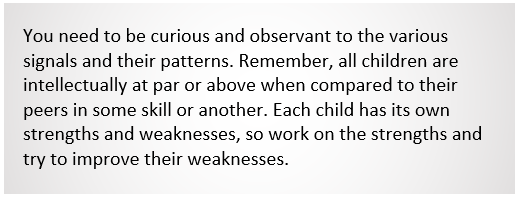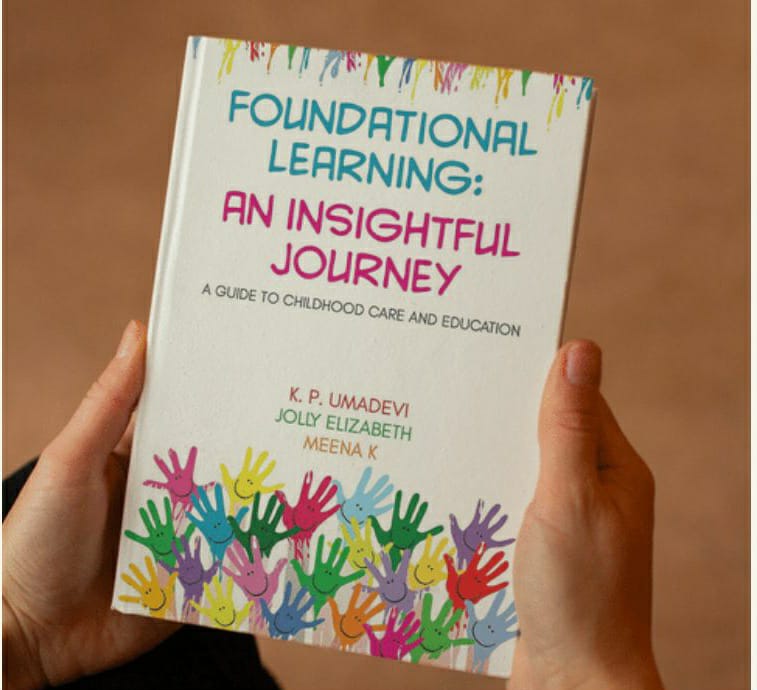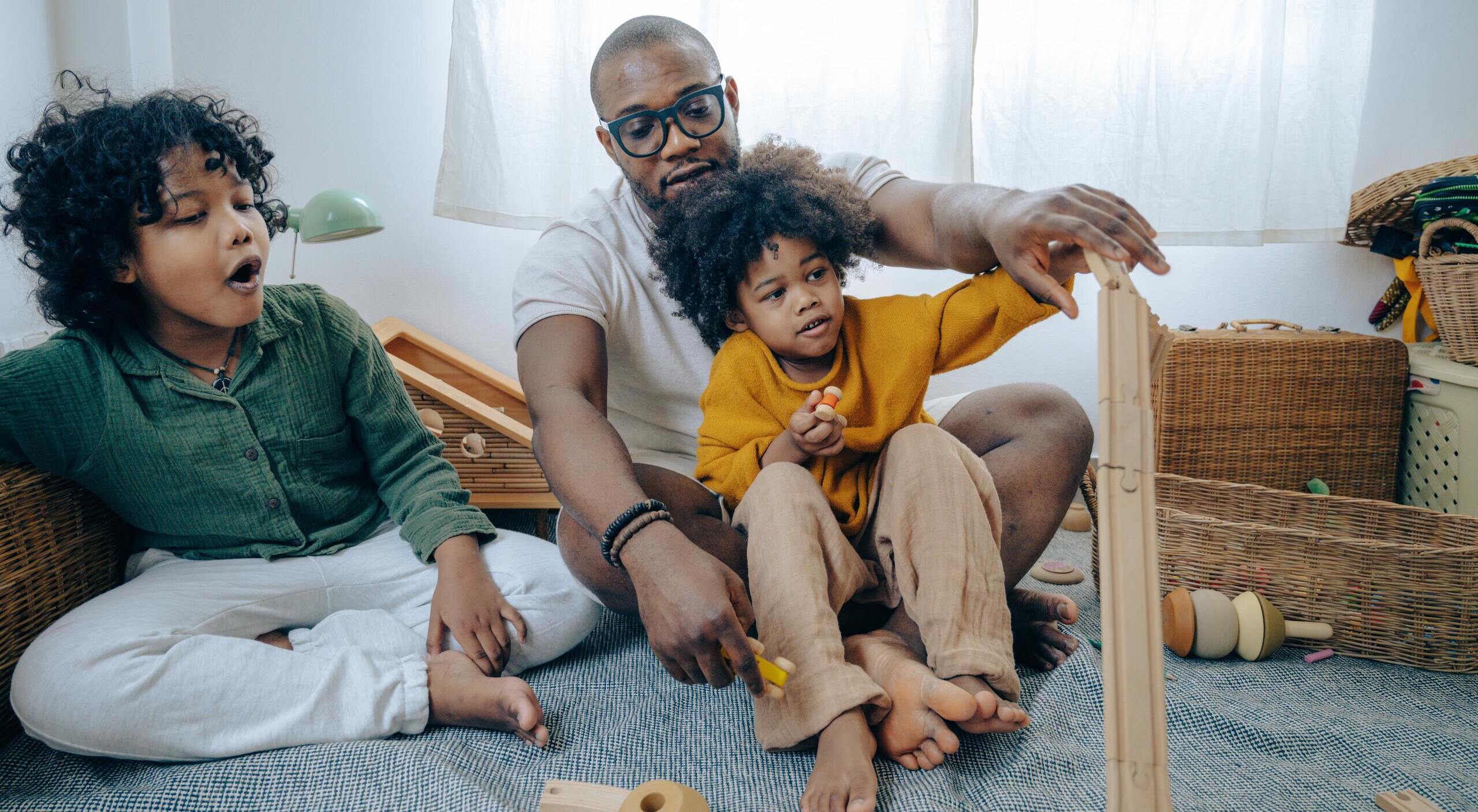In conversation with
KP Umadevi | Jolly Elizabeth | Meena K | Saroja Muralikrishnan
Bhavans Nursery Teachers Training College, Kochi | Authors - Foundational Learning: An insightful journey
The first eight years of a child's life are the most critical as they build the foundation for future learning, health and success. 90% of the brain's growth occurs by the age of 5.
In July 2020, the Ministry of Education, Gov of India released the new National Education Policy, where schooling begins with the inclusion of ECCE from age 3. The policy states "Universal provisioning of quality early childhood development, care, and education must thus be achieved as soon as possible, and no later than 2030, to ensure that all students entering Grade 1 are school ready."
Our approach to early childhood is influenced by a combination of what we see and experience across our lives - our upbringing, schooling, childhood friends, discussion with colleagues etc. More often we come across queries which make us search for answers and keep us perennially unsatisfied. Is my child happy with whatever I give? Am I able to understand their need? Is my child on the right path of growth and development? Is not my child better than me when I was of the same age? Is not my child great in school? Am I a good parent?
In this feature, we have four senior teachers from Bharatiya Vidya Bhavan, Kochi, each having many decades of experience in the field of education. KP Umadevi is a senior educationist and the coordinator of the Bhavans Nursery Teachers Training College (BNTTC), Kochi. Jolly Elizabeth is an expert in psychotherapy, food & nutrition etc. Meena K has extensive experience in special education. Saroja Muralikrishnan has primary focus on English and Literature across her career as teacher and Lecturer. Their recently launched book "Foundational Learning: An insightful journey" talks in depth about childhood care and education.
Q. There is a lot of uncertainty with the mode of learning currently due to changing covid restrictions. Flipping between online and offline classes, I feel that my child is exposed to huge number of variabilities and stress. How can we help our child tackle this situation? How will the journey be forward?

KP Umadevi : This is indeed a point of concern as we are at a unique juncture in history wherein mankind is unable to predict the very ability to move out freely. Switching from online to offline mode may look like just getting back to traditional methods - but as a parent we should not assume familiarity with the situation. We should avoid trivializing the condition and need to be empathetic. The switch back and forth may not be an easy experience for all. There is bound to be fear and anxiety due to the unpredictable nature of how classes or exams get conducted. Lack of continuous interaction with friends bring in need for emotional support. Democratic parenting helps in such situations.
You should be a patient listener to your child's words - their opinions are of great value as they are going through the turmoil. You may also want to consider that children are the best in simplifying challenges - adults tend to complicate the signals. Your presence, patience, love and support will help them overcome impediments by themselves.
Avoid comparisons. Every child is exposed to a different environment. Rather than advising your child, it would be better that you inspire them onto getting self-motivated. It could be as simple as picking up a new skill (painting, gardening, reading etc) which would continuously keep them motivated, excite them and make them look forward to social interactions. Your child should also be encouraged to maintain routines of food, exercise and sleep which is fairly neutral to the online/ offline mode - massive swings in schedules could add to their mental stress. As a parent, you should also have a reasonable understanding of the proceedings in school as education will no longer remain within the confines of the four walls of the school classroom.
While predicting the future is impossible, one thing which is coming out clear is the definite co-existence of online and offline modes of imparting education. Technology and platforms may not just be an accessory but an active enabler in bringing inclusive education to a wider section of the society. We will probably see a well-structured curriculum classifying the topics into the online and offline mode based on teaching objectives, possibilities in teaching activities and evolution of new classroom scenarios.

Q. As a parent we are quite aware of how important food and nutrition is for the child. How can I bring in the right mix in my child's diet, considering that their likes are very much towards convenience food?

Jolly Elizabeth : Food is an integral part of a child's growth. The quantity and quality of food intake is in accordance to the stages and activities of the life of an individual.
It is right that we are in an age where parents are very busy with work and life. Access to convenient food like pizza, burger, noodles, french-fries, Lasagna etc has increased due to urbanization, flooding of options in our supermarkets and availability of home delivery options from restaurants. However, as a parent we will need to be absolutely clear that it is our actions which has the largest impact on the diet of our child. Children mimic their parent's behaviour - so the first level of responsibility lies in our own eating habits.
Children love fun and introducing them to food through creative funny presentations help. Avoid enforcing any food on the child, nor should we blame them on their eating habits. Serve them the best and try to be neutral. Let the child be part of selecting fruits and vegetables when you purchase them and see how well they understand their processing in the kitchen.
Read also: How to keep kids healthy and physically fit
There is also no point in being absolutely strict and stubborn - try to permit all foods in moderation so that cravings for a particular food could be avoided. Try to make convenience food at home rather than ordering from restaurants so that you have absolute control on the quality and quantity of ingredients used (less oil, no taste makers etc). Above all, your dining table should be a platform for family bonding.
I had an instance where a parent approached me for the lethargy shown by their child. The child was obese. Upon further discussion with the parent, it was evident that the child was consistently exposed to convenience food like Pizza and Lasagna along with carbonated drinks. The influence of advertisements made even the parents forget about nutrition while choosing hygiene and comfort during every weekend outing. The child showed a craving to convenience food and had started absolutely avoiding any other form of food. With home delivery options available, these food types slowly got into the menu of dinner in some weekdays too.
Here, awareness for parent was the first necessary step. A detailed calorie chart was created for traditional and convenience food. Parents got to learn how to make traditional food with the appearance of convenience food. Convenience food was confined to once a month – that too cooked at home with restriction on ingredients. Weekend outings were planned with no food from outside. The family made exercise a part of daily routine and fun. The path to revival should be slow and steady.

Q. Every time I notice something improper with my child (studies, behaviour etc), I tend to feel uncomfortable and get into a panic mood. How do I understand which are the critical signals that are required to be understood correctly early on so that the right and timely action could be taken?

Meena K : Every child has their good days and bad days and mood swings like all of us. A behavioural activity becomes problematic depending on the intensity, duration and the situation in which it is expressed. When you think there is a behavioral issue, follow these five steps
- *Observe* your child and check whether they are showing the problem over a period of time in all situations. See if they are concentrating on the task, sitting in their place (be it drawing, colouring or even watching TV).
- *Interact* with the little one, talk to them, play with them and find out if anything is disturbing him - any health issues or whether they are being getting bullied, misused or abused.
- *Talk to the teacher* and find out the behaviour pattern in school environment. See whether the child has friends or walks aloof, whether they involve in group plays and share their toys.
- *Go through the class work and activity sheets* with the help of the teacher. Check the quality of his work. See if it is neat or messy, complete or half done. The work may show omitted letters, words or sentences. A child with difficulty in writing and spelling may show reversal or addition of letters or words.
- *Never hesitate to consult a health provider* like a paediatrician if you have concerns because some concerns may turn out to be not a problem at all.
I remember a parent approach me for their 3rd standard kid. They were worried about the child's mood swings, below average social and communication skills. IQ was also found to be below average. We had a detailed series of session with the parent and charted out an IEP (Individualized Education Plan). In addition, a set of small responsibilities were given to the child. Positive behaviour was rewarded. We constituted an one on one help in studies, focussed teaching of just one language, DIY - do it yourself hobbies were brought in the child's daily activities and we made her participate in every class activity. It was a pleasure to team up with the parents to see a consistent progress in the child.
Panicking or procrastination is not a solution for any problem. You need to be curious and observant to the various signals and their patterns. Remember, all children are intellectually at par or above when compared to their peers in some skill or another. Each child has its own strengths and weaknesses, so work on the strengths and try to improve their weaknesses.

Q. With so many devices around, a lot of my child's activities are closely integrated to them - be it games, entertainment or for that matter even learning through videos. How can I inculcate a reading habit in my child amidst all the noise?

Saroja Muralikrishnan : There is no quick fix solution to this situation as the ideal step to create an interest in reading in any child is to start reading to a child from the first month after its birth.
That being out of the question, start engaging the child in conversations on topics of its interest; narrate stories to develop focus. Then, read aloud stories and articles. Next step can be making the child look at the page while you read aloud with fingers pointing to the words. When it becomes a routine to read aloud, get the child to take turns in reading.
The child can be asked to narrate the story read to it and the parent can narrate what the child read aloud. So, it is essential to create the habit. There can be definite time set aside when every member reads silently to promote the idea of the need to read every day. It is indeed a sustained effort that can yield results.
Kid's books can be part of the playthings initially which can gradually be made into a library. Continuous proximity to books will enhance the knowledge seeking skills of the child. Greater the number of books at home, greater the literacy and numeracy of the child as it grows.

Q. It is great to see teachers come together and bring out a book on childhood care and education. What was the journey like? Anything you are looking forward to?

KP Umadevi : At BNTTC, our primary focus has been to constantly improvise the Nursery teachers training program. With the introduction of NEP 2020, there was a lot of thought put in to incorporate the recommendations and changes into our program. With the pandemic on, while the teachers training classes did continue in the online mode, we did miss the physical interactions with students and alumni.
Writing a book was never in our thoughts, and it was triggered by a question from my son, which then we four discussed. Once aligned, it was a matter of getting to our writing board. There were a lot of deliberations on the content and sequencing. Finally, the joy of seeing our book in the current shape and form is immense - something which we will cherish our entire life.
While the pandemic restricted us to our homes, we are happy that the physical constraints helped us think through our work and share our thoughts. We are sure that everyone who reads our book, takes back a bit of what we have heard and seen through our long career.
